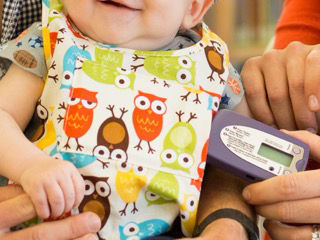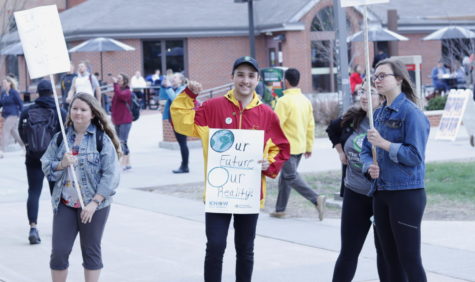New ISU outreach project attempts to expand literacy in younger children

Constance Beecher, assistant professor of education, leads a research project to expand literacy in young children.
October 21, 2015
The amount of words a child hears in a day isn’t exactly what parents are keeping in mind when it comes to raising a child, but for an ISU outreach project, that’s the only thing it has in mind.
Constance Beecher, assistant professor in the School of Education, knew that she wanted to focus on family literacy after recognizing the need for early childhood language intervention when it came to her grade school special education students.
“I always had this feeling like, ‘gosh, if I could have started working with their families sooner about getting some more language enrichment and more reading with their kids, it would have really made a difference,’” Beecher said.
Setting out to make this feeling a reality, Beecher did her post-doctoral research at the Juniper Gardens Children’s Project at the University of Kansas, where in 1995, Betty Hart and Todd Risley discovered that in some lower income homes, children heard millions of fewer words by the time they got to kindergarten.
“That difference caused them to have what we would maybe call the kindergarten readiness gap,” Beecher said.
In the study, Hart and Risley went to 42 families from several socioeconomic backgrounds and assessed the exchanges between parent and child. This study helped improve the understanding between parent-child interactions and how those interactions shape the literacy of the child as he or she gets older.
Hart and Risley discovered that between families on welfare and high-income families, 30 million more words were being heard by the higher income children. This gap, referred to by Beecher, not only puts a child years behind their peers but also highlights a negative future for the lower-income child.
Beecher, intending to reach out to 150 families beginning in January and extending over the next two years, is using language environment analysis technology to try and lessen this 30-million-word gap. She is doing this through her grant-funded project, “Small Talk Story County.”
The technology, a digital recording device that is specially designed for babies to wear in a vest, can record up to 16 hours of data at a time. Beecher is using this device to record the amount of words that the children in the project hear each day.
“[The technology] records all the talk directed at the baby in the day,” Beecher said.
The computer then takes the information from the technology and tells Beecher how many words the child heard that day.
The ages of the children in the project range from birth to 2 and a half years. Beecher said those ages are when the most critical brain development takes place in a child’s life, which stresses the importance of such early intervention with literacy.
The amount of words a child hears each day, which can average from as little as 8,000 to as many as 20,000 plays a fundamental role in both the wellness of parent and child.
Through Beecher’s project, which is also a partnership with Raising Readers in Story County and the Ames Public Library, Beecher hopes to educate and increase the amount of words a baby or child hears each day.
The program, which includes an eight-week parenting class, will guide parents through talking tips and act as sort of a support group for parents, Beecher said.
“One thing that we recommend parents do is just to always narrate what you are doing,” she said. “So, as you are going about your day with your baby, you’re just talking out loud about what you’re doing.”
For example, Beecher said that while doing laundry, a parent might say they are folding the shirt or pouring the dish soap.
After the initial eight-weeks, families are asked to come in once a month for about 10 more months to follow up on how the child is doing and to see if the parents are still keeping up with the amount of words their child hears.
One of the challenges the project faces, however, is the Hawthorne effect. Because the parents know they are being recorded, for the first few days with the language environment analysis technology, the parents will try harder to say more words, which messes with the data.
Beecher said this usually goes away after a few times using the technology because the parents stop making note of the fact that it is there.
To help with the research, the grant, which was made possible by a three-year, $435,000 donation to the Ames Public Library Friends Foundation, will pay for a coordinator, parent educator and research assistant.
Kim Hanna, executive director of Raising Readers in Story County, said the organization is supporting the project by helping recruit and letting families know about the outreach.
Raising Readers offers 17 different programs, including “Reach out and Read,” free tutoring programs and summer enrichment programs that help children improve literacy during the summer. These programs provide children and parents a better opportunity to learn and improve their skills.
Hanna said she thinks it’s very interesting to find out how many words the babies hear in a day.
Eventually, Small Talk Story County hopes to expand to families across the state that would benefit most from the program.
“What we’re finding is that the number of children living in poverty is increasing, unfortunately,” Beecher said. “The tendency is that those families have less of talking and reading and less enriching exchanges, and so it effects those individual families, but it also effects society.”
















